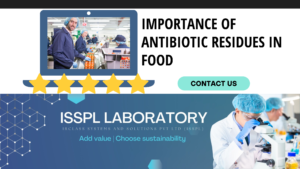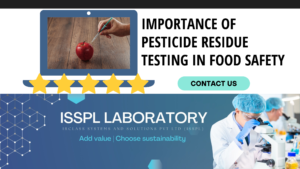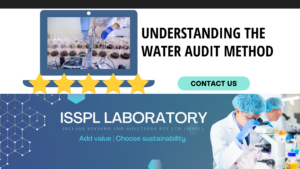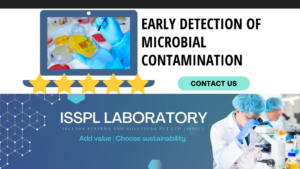An Overview by Team ISSPL - Analytical Testing Laboratory in India
ToggleThere has been a significant surge in the popularity and demand for organic food. More and more people are opting for organic produce, driven by concerns about their health, the environment, and sustainability. The reasons are as follows:
Health Benefit
One of the primary reasons individuals choose organic food is the perceived health benefits. Organic farming practices prioritize soil health and biodiversity, resulting in nutrient-rich produce.
Environmental Sustainability
Organic agriculture promotes environmental sustainability in several ways. By avoiding the use of synthetic pesticides and fertilizers, organic farming minimizes soil and water contamination, preserving the delicate balance of ecosystems. Organic farmers prioritize crop rotation, natural pest control methods, and the use of compost and manure to enhance soil fertility and structure.
These practices help conserve biodiversity, promote healthy pollinator populations, and reduce the overall ecological footprint of food production.
Avoidance of Chemical Residues
Pesticides used in conventional farming can leave residues on crops, which can then find their way into our bodies when we consume them. Organic food, on the other hand, is produced without synthetic pesticides and is subject to strict regulations and testing.
Supporting Local Communities
Organic farming often aligns with local and small-scale agriculture, supporting rural economies and local communities. Buying organic food directly from local farmers or through farmers’ markets promotes a sense of community, enables consumers to forge connections with growers, and helps ensure a fair and sustainable food system for all.
Ethical Animal Treatment
Organic standards encompass guidelines for the ethical treatment of animals. Organic livestock farming requires animals to have access to outdoor areas, ample space to move, and the ability to engage in natural behaviors.
The Agricultural and Processed Food Products Export Development Authority
APEDA’s stringent guidelines and certifications help maintain the integrity of organic food, providing consumers with reliable assurances about the authenticity of the products they purchase. APEDA contributes to the growth and credibility of the organic food industry in India. Laboratory testing is a vital component of the certification process, providing objective and scientific evidence of a product’s compliance with organic standards.
APEDA collaborates with accredited laboratories to conduct rigorous testing on spices to verify their pesticide-free status. Testing organic food products is a crucial aspect of ensuring their authenticity, quality, and compliance with organic standards.

Some common tests conducted on organic food products
- Pesticide Residue Testing: Organic foods should not contain synthetic pesticides or chemicals. Testing is done to ensure that the products are free from pesticide residues and other contaminants.
- Heavy Metal Analysis: This test checks for the presence of heavy metals like lead, cadmium, mercury, and arsenic, which can be harmful if present in excessive amounts.
- Genetically Modified Organism (GMO) Testing: Organic foods should not contain genetically modified organisms. GMO testing is performed to confirm the absence of genetically modified materials.
- Microbiological Testing: This test assesses the presence of harmful microorganisms, such as bacteria, yeast, molds, and pathogens, which can lead to foodborne illnesses.
- Nutritional Analysis: Organic food products are often tested for their nutrient content, including vitamins, minerals, proteins, and carbohydrates.
- Allergen Testing: Organic products may also be tested for the presence of common allergens like nuts, dairy, soy, gluten, etc., to ensure accurate labeling.
- Authenticity and Adulteration Testing: In some cases, tests are conducted to verify the authenticity of organic products and to detect any adulteration or contamination.
- Organic Certification Verification: Testing is done to confirm that the products meet the criteria for organic certification established by various organic regulatory bodies.
APEDA’s role in promoting and regulating organic products in India has been instrumental in expanding the country’s organic exports. By adhering to strict organic standards and ensuring the integrity of organic products, APEDA has helped Indian farmers and processors gain recognition in global markets.
Food testing laboratories, on the other hand, are pivotal in validating the organic certification process. By conducting various tests and analyses, they ensure that organic products meet the required standards and provide consumers with safe, healthy, and trustworthy choices.
Together, APEDA and food testing laboratories are key players in promoting sustainable agricultural practices, protecting consumers, and fostering the growth of the organic food industry. With their continued efforts, organic products are poised to make an even greater impact on the global food market in the years to come.
IRCLASS, a leading testing, inspection and certification company globally and in Jaipur we have state-of-the art ISSPL Lab accredited by NABL/ ISO 17025: and recognized by APEDA, EIC and FSSAI. At IRCLASS Systems & Solutions Pvt Ltd (ISSPL), Testing Laboratory, we conduct various tests and analyses, ensure that organic products meet the required standards and provide consumers with safe, healthy, and trustworthy choices.
Contact us to know more about our services.
Dr Sudeb Mandal: National Head – Testing Services
Mobile/WhatsApp: +91-8777727345
Email: Sudeb.Mandal@irclass.org
Website: www.isspllab.com | www.irclass.org | www.irqs.co.in







